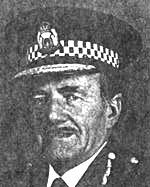 Return to top of front page
Return to top of front page
THE MAN WHO CONVICTED GEORGE BEATTIE.
WILLIAM MUNCIE - Assistant Chief Constable, Strathclyde Police.
In 1973, William Muncie was acknowledged to be the most experienced detective in Scotland. Born in Carluke in 1915, he had never been on the fast track in the police service. In fact he had tried several jobs in his home village before joining the police force in 1936 in the coal and iron town of Shotts - just a few miles north of Carluke. For two and a half years he learned the hard way - chasing petty criminals, usually on foot. Muncie was excited by police work. He preferred night duty to day work because days were generally devoted to traffic offences and desk jobs. Muncie was a tracker. He liked to 'target' criminals, leaving 'tell tails' on doors and garages so that he would know if the suspect had gone out just before a crime was committed. Slips of paper in door jambs, twigs laid on garage handles, these were the tricks by which William Muncie slowly made his reputation.
Muncie was a big hulk of a man, standing just under six feet, with broad muscular shoulders. He was always an imposing figure. Along his upper lip he now sported a dark stiff moustache which he trimmed every morning. It gave him a military look and was, to many, his most distinctive feature.
As the years went by, his chin became less rugged and more rounded. When he became noticeably bald he took to allowing his hair to grow long, combing some of it up over the bald pate, while allowing some to curl up above his ears. He generally carried a soft tweed hat in his pocket which he would put on whenever photographers were about.
Muncie was wily and shrewd, but he could be very genial, even gentle. He had a ready smile, and the lines on his weather-beaten face, particularly around the eyes, gave those he spoke to the impression that he had a kindly disposition.
The geniality was deceptive. Muncie deliberately projected the image of the country copper because it was good for publicity. Even when he later rose to the heights of his profession, he cultivated a soft, gentle image - taking up pursuits such as oil painting, a country pursuit appropriate to his ultimate position in society. Yet he could act ruthlessly because of his driving ambition. Pictures painted by those who knew him always have this dark side of William Muncie.
His first murder case in June 1958 set the pattern for the 51 that followed. He fixed on a suspect from witness evidence, then tricked the wife of his suspect into identifying a particular cigarette lighter as being her husband's. He then obtained a confession from the suspect. This pattern is exactly what happened in the Beattie case - Muncie's 52nd and last murder investigation. Muncie believed he had the necessary intuition to make a master detective. He thought he was psychic. He once said that mammals and birds have extra built-in senses - and so have policemen.
Muncie liked publicity. He worked tirelessly to promote a good image for both himself and his force. He organised many campaigns to help prevent crime - and usually figured as the leading spokesman in them. Each murder case, just like this last case in Carluke, was used as a stepping stone to further success in the media. Any investigation in Lanarkshire might well finish up with the headline "Muncie gets his Man!" The "Boss" liked that approach - and so did the Press.
By 1973 everyone in the business knew the set pattern of a Muncie case. Yet another element had crept into them, which Muncie would never have admitted to. Press publicity had begun to dictate how an investigation progressed. Muncie preferred to recount a different version of this. Not long after the Carluke murder case a group of reporters told Muncie that he had "treated them like mushrooms. "
"Mushrooms? asked Muncie, " what do you mean?"
"You kept us in the dark and fed us with muck " came the jocular response.
Muncie wanted to believe this was true. But in fact a darker truth lay hidden behind his relations with the Press. He needed the headlines to maintain his high profile.
In 1973 no one realised it, no one would have admitted it if they had, but Muncie was well past his sell-by date as a detective. He was rooted in out-dated romantic notions of his psychic superiority. He was bringing to each new case, such as this last case in Carluke, a desire to re-live his former glories, regardless of the facts. The Carluke murder case thus became a prime candidate for quick and ill-advised decisions.
There was an important element in the Carluke investigation that was never mentioned in public, yet it was part of the police rumour machine throughout. Muncie, after fifteen years as head of the CID, was up for promotion. It was his last chance for advancement - the post of Assistant Chief Constable was open and he had applied for it. He should have expected no problems as the Appointment Board, his success rate was phenomenal. He had never lost a murder case. But he would not care to go before the Board with this last case unsolved. It might leave a question mark over him. It might just cost him the job
And that was one reason why George Beattie was convicted as he was. Beattie had to be guilty - Muncie's new job depended on it. He would have either glory as the new Assistant Chief Constable, or the ignominy of being a lame-duck Head of CID moving swiftly to early retirement. Return to top of front page
Return to top of front page
 Return to Main text
Return to Main text